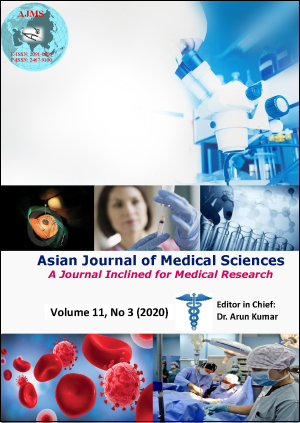Comparison of heart rate recovery between normotensive young adults with and without a parental history of hypertension
Keywords:
Autonomic dysfunction, Exercise, Non hypertensive young adults, 3-minute step test, Heart rate recovery index (HRRI)Abstract
Introduction: Studies have reported that off springs of hypertensive parents are more likely to develop hypertension. Affection of target organ starts even before the diagnosis of hypertension. Autonomic dysfunction may be the initial cardiac effects in the pathogenesis of hypertension. Till now very few studies have been done to find the early outcomes in the cardiac autonomic functions in the normotensive siblings of hypertensive patients. Heart rate recovery after exercise is a useful marker for cardiac autonomic function. Since the etio-pathogenesis of hypertension is expected to affect the autonomic cardiovascular parameters even before the prehypertensive stage, the following study was carried out to analyze the heart rate recovery, in the descendent non- hypertensive young adults with and without parental history of hypertension.
Aim and objective: This research study was aimed to study the quantify and compare the difference (if any) of heart rate recovery in response to 3minute step test between non hypertensive children of non- hypertensive and hypertensive parents within an age group of 18-22 years.
Material &Methods: A total of 63 normotensive students were divided into one hypertensive parents(HP) group containing students with parental history of hypertension) and one non hypertensive parents group (NHP) having students without parental history of hypertension). Each student was subjected to 3 minute Master step test. Recordings of heart rate were made before and after exercise. Heart rate recovery index (HRRI) of 1minute (HRRI1), as well as in 2, 3 and 4 minute (HRRI2, HRRI3, HRRI4) were calculated and analyzed.
Results: The resting (basal) heart rate as well as 1st minute heart rate recovery index (HRRI1) was not significantly different in the two groups. Likewise, the 2nd minute (HRRI2), 3rd minute (HRRI3), and 4th minute HRRI (HRR4) respectively were also not significantly different between the two groups.
Conclusion: This study concluded that there is no significant difference in heart rate recovery among non-hypertensive young adults, with and without parental history of hypertension.
Downloads
Downloads
Published
How to Cite
Issue
Section
License
Authors who publish with this journal agree to the following terms:
- The journal holds copyright and publishes the work under a Creative Commons CC-BY-NC license that permits use, distribution and reprduction in any medium, provided the original work is properly cited and is not used for commercial purposes. The journal should be recognised as the original publisher of this work.
- Authors are able to enter into separate, additional contractual arrangements for the non-exclusive distribution of the journal's published version of the work (e.g., post it to an institutional repository or publish it in a book), with an acknowledgement of its initial publication in this journal.
- Authors are permitted and encouraged to post their work online (e.g., in institutional repositories or on their website) prior to and during the submission process, as it can lead to productive exchanges, as well as earlier and greater citation of published work (See The Effect of Open Access).




